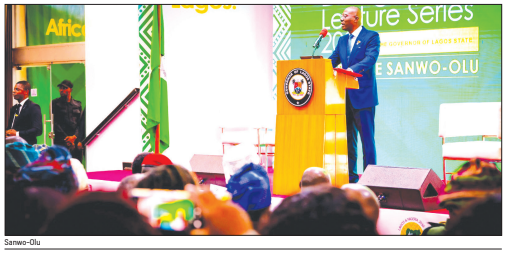Lagos State Governor Babajide Sanwo-Olu delivered the inaugural Distinguished Lecture Series of the Nigerian Institute of International Affairs (NIIA) in Victoria Island, examining how the nation could attain global influence by harnessing its most endowed asset — the youth.
The nation’s young population, Sanwo-Olu echoed at the lecture with the theme: “Lagos and Nigeria 2030: Projections of a World Power”, remained one of the largest, with an estimate of 100 million people under the age of 20.
This, the governor said, was an extraordinary asset that could catapult Nigeria to the global stage of economic influence, but only if the asset would be properly harnessed.
The audience, comprising academics, policy researchers, professionals in public sector, captains of industry, veteran journalists and traditional rulers, was held spell-bound in the Institute’s main auditorium as the Governor delved into the lecture.
Sanwo-Olu dissected the nation’s growth journey from the era of oil-controlled global economic leadership of the 20th century through the contemporary period driven largely by technological revolution, cyber warfare and transition fuel.
The governor opined that the term “world power” was not a static concept, but a constantly evolving notion in the realm of global politics.
The Lagos helmsman said the end of 20th century saw Nigeria usher indemocracy to close a dark era in which the nation grappled with political turmoil and international disconnection.
He said the nation entered into the 21st century with tensions of democracy, constitutionalism and federalism, while setting forward development visions that would propel its growth away from the misadventure of the military era.
Sanwo-Olu said the unbroken period of civilian government had entrenched the nation’s freedom to excel in different areas of creative abilities, while attracting global attention in contemporary fields ranging from academic, literature to film, sports, music and fashion.
“As democracy evolved, he said Nigeria must now focus on unlocking its potential to conquer new ground in areas driving modern economic system.”















